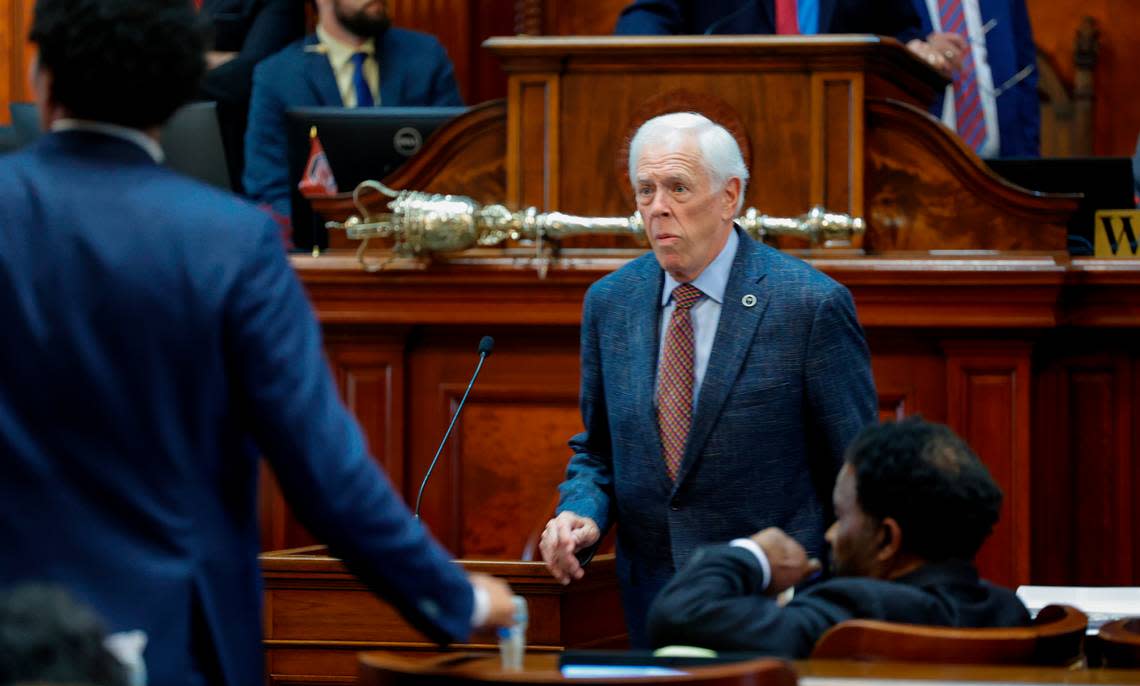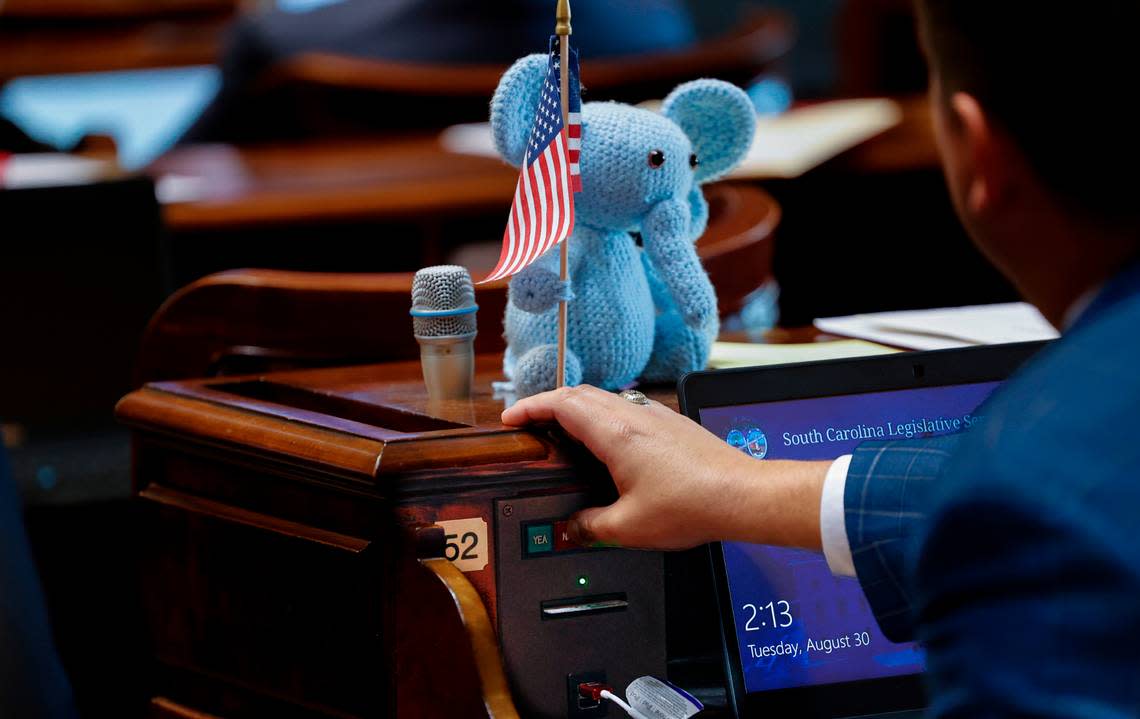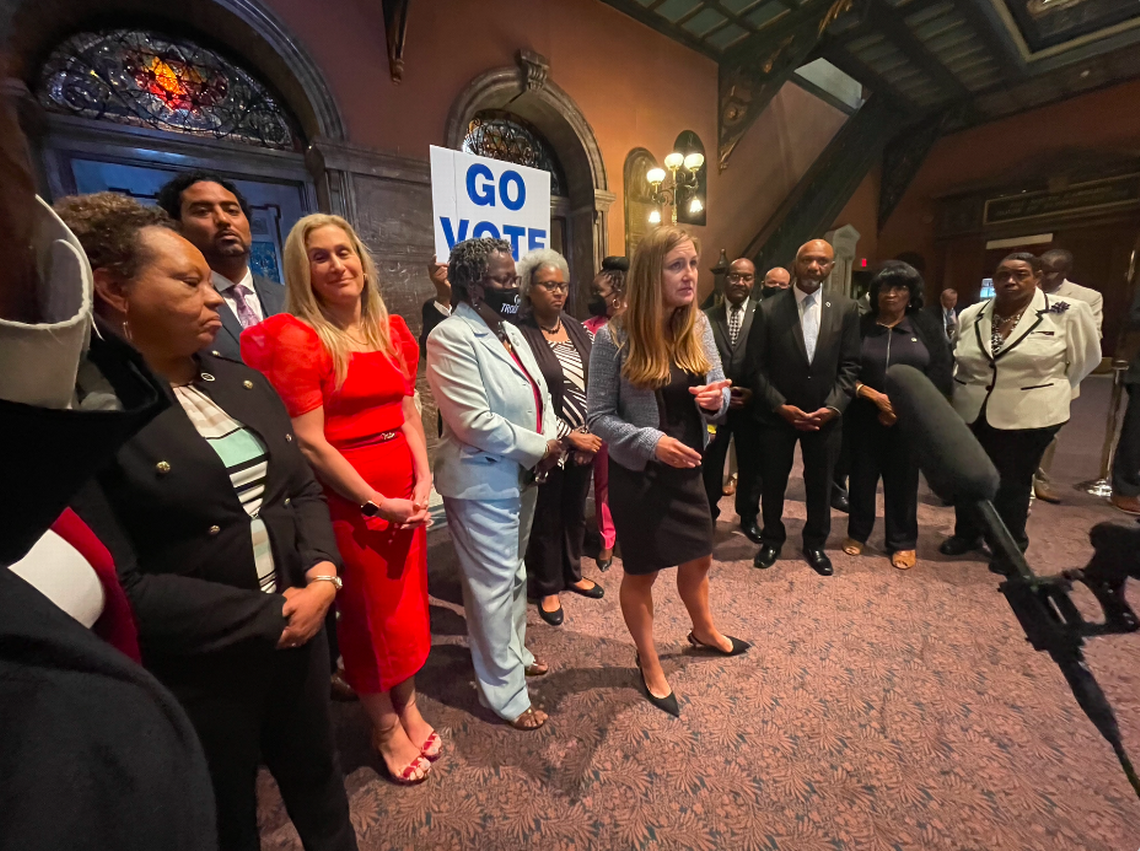SC House advances near-total abortion ban with rape, incest exceptions up to 12 weeks
The South Carolina House on Tuesday advanced a near-total abortion ban with exceptions for rape, incest and life and health of a mother after a Republican-led scramble of procedural moves spoiled Democrats’ strategy to kill the bill.
The legislation, H. 5399, passed by a 67-38 vote Tuesday following an hours-long debate that often pitted Republicans against one another and an initial vote where 19 Republicans joined Democrats to shelve the bill because it originally lacked rape and incest exceptions.
One Democrat, Dillon Rep. Jackie Hayes, joined Republicans to ultimately pass the bill and send it to the Senate. Two Republicans, retiring Charleston Rep. William Cogswell and Greenville Rep. Patrick Haddon, who opposed adding exceptions, voted with Democrats to oppose the legislation.
“At the end of the day, we have passed a good, pro-life bill in South Carolina,” state Rep. John McCravy, a Greenwood Republican who shepherded the bill through the chamber, told reporters shortly after the vote.
The Senate returns Sept. 6, and should they make changes and pass the bill, House Speaker Murrell Smith, R-Sumter, told colleagues Wednesday he expects the chamber to return the week after to finalize the bill and send it to the governor’s desk.
After changes, the legislation now makes exceptions to allow abortions in the cases of rape or incest up until around 12 weeks of pregnancy. The exception would require doctors to report the allegation of rape or incest to the county sheriff no later than 24 hours after performing the procedure. It also allows doctors to legally perform an abortion if a mother’s life and health are at risk, listing a handful of medical emergencies that would make the procedure permissible.
The ban does not, however, include explicit exceptions for fetal anomalies.
Republicans also slid in an amendment that intends to require a biological father pay costs related to the child starting at conception and cover in full should the child be conceived by a crime.
Though Democrats hold the minority in the chamber, all eyes Tuesday were watching Republicans, who had the votes to pass abortion legislation but were split over the original proposal’s lack of rape and incest exceptions — a move many Republicans said they were unwilling to support.
Others, such as Rep. Bill Taylor, R-Aiken, called the Legislature’s abortion debate “premature.”
“We are legislators, not doctors. Do we know enough? I think not,” Taylor wrote in an emailed newsletter Tuesday morning before the House returned. “Have we fixed the things that need fixing before increasing the difficulty of seeking an abortion? The answer is no.”
Gov. Henry McMaster has said he will sign abortion legislation should it reach his desk.
“This is a good starting point for the Senate to begin its deliberations,” said Brian Symmes, McMaster’s spokesperson.

GOP overcomes Democrats’ strategy to kill bill
The House’s debate was anticipated to take days, with some legislators anticipating thousands of amendments. But the chamber quickly blew through the amendments, and legislators were ready to vote on the bill that lacked rape and incest exceptions.
That was until House Majority Leader Davey Hiott, R-Pickens, abruptly called for a recess to strategize in caucus. The caucus meeting lasted nearly two hours and, upon their return, resulted in a whiplash of procedural moves to stop the Democrats’ strategy.
“We knew that this was an emotional, personal issue to everybody. We also understood that we needed to pass a bill for South Carolina. It was that important to us,” Hiott, who became House Republican leader this year after his predecessor, Rep. Gary Simrill, R-York, stepped down to lead the House Ways and Means Committee, told reporters after the vote.
“That was the consensus amongst the caucus members that we have to pass something, we can’t let this get by us,” Hiott continued. “If I told you it was pleasant in there, I’d be lying to you.”
A group of roughly 20 House lawmakers, made up of the chamber’s more conservative members, signed a letter earlier this week that said the addition of any rape and incest exceptions would be enough for them to vote against the proposed bill, dooming its chances of advancing.
In the end, only three of those Republicans — Reps. Stewart Jones, Anne Thayer and Richie Yow (who did not attend session because of a family death) — did not vote on the bill. State Rep. Haddon voted against the legislation.
“We’ve got a growing consensus in the House that is not committed to voting for the bill if that happens,” Jones, R-Laurens, told reporters Monday.
In at least three instances on the floor, Democrats joined the chamber’s more conservative Republicans members voting against adding rape and incest exceptions — a clear strategy meant to kill the bill.
And, on two occasions, Democrats offered amendments to put abortion access on the ballot and to broadly protect access to abortions, contraception and assisted reproductive treatment, but prohibit late-term abortions except in certain cases.
That strategy did not work out.
“I am so very glad to be a member of a caucus where your arm is not twisted to do something that goes against your core,” state Rep. Gilda Cobb-Hunter told reporters Tuesday as Republicans met in caucus.
Hiott said later Tuesday that Republicans weren’t “too concerned” about Democratic efforts, considering abortion a “Republican issue” and part of the state’s Republican Party platform.
“So the Republicans needed to control the narrative on this issue,” Hiott said. “... At the end of the day, we came back and we were unified. We think we got a great bill for the state of South Carolina.”

‘If you don’t like it, get your own house in order’
After the U.S. Supreme Court struck down Roe v. Wade in June, the state Legislature greenlit a special-called session to respond to the ruling.
South Carolina’s current abortion ban, which bans the procedure at around six weeks, passed in 2021. It’s currently on hold after the state Supreme Court this month granted a temporary restraining order, leaving the state’s 20-week ban in place.
McCravy previously said the legislation is not intended to prohibit contraception or restrict assisted reproductive treatment, like in vitro fertilization. And he said the legislation would not subject women who seek abortions to prosecution or restrict interstate travel.
Many doctors and other abortion rights advocates, however, say the proposed legislation will hurt women and that the language is too vague, opening up the possibility that doctors may not want to perform legal abortions because they believe their jobs will be at risk.
Charleston Democratic Rep. Spencer Wetmore called the bill restrictive and cruel.
“We’re hear talking about abortion, and we can’t even keep mothers and babies alive,” Wetmore told reporters. “We don’t want to be here today. We don’t want to be talking about this issue again and again and again, but here we are.
“And I think it’s very clear ... when we have an extreme party in power, they’re going to push extreme policies because they have absolutely empowered the base of their party to tell them how to vote.”

The current proposal was advanced this month by the House Judiciary Committee, mostly along party lines, though three Republicans, including one who lost his House seat in the primary, did not vote. It was an indication of the apprehension among some legislators in the debate, though two of those legislators — Republican Reps. Micah Caskey, of Lexington County, and Neal Collins, of Pickens County — ultimately voted to advance the bill.
“This is not our bill. We didn’t pass this bill out of committee. We’re not the ones trying to strip the rights and freedoms and equality and health care choices away from the women of South Carolina,” state Rep. Leon Stavrinakis, D-Charleston, said on the floor after some Republicans lambasted Democrats for trying to kill the bill by voting against rape and incest exceptions.
“That’s not us; don’t blame us. If you don’t like it, get your own house in order.”
